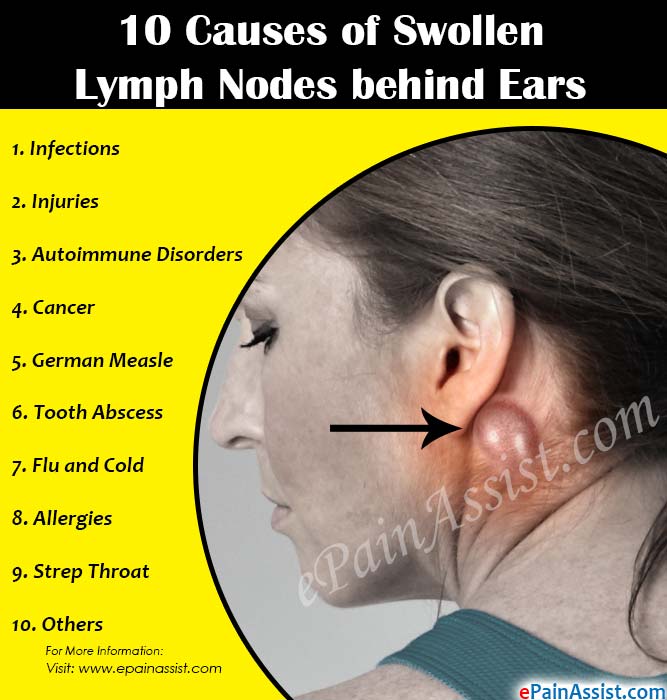
Unraveling The Enigma Of Swollen Lymph Nodes Behind Ears: Causes, Remedies, And Expert Insights
Swollen lymph nodes behind the ears, often overlooked, can signal underlying health concerns. Understanding the causes and seeking prompt medical attention are crucial for proper diagnosis and treatment. This comprehensive guide unravels the enigma of swollen lymph nodes behind the ears, empowering you with the knowledge to navigate this health issue with confidence.
Understanding Lymph Nodes
Lymph nodes are small, bean-shaped structures that play a vital role in the body’s immune system. They filter harmful substances, such as bacteria and viruses, from the lymph fluid that circulates throughout the body. When the body encounters an infection or inflammation, lymph nodes may swell as they work to combat the foreign invaders.
Locations and Significance
Lymph nodes are located throughout the body, including behind the ears, in the neck, armpits, and groin. Swollen lymph nodes in specific areas often indicate infection or inflammation in nearby regions. For instance, swollen lymph nodes behind the ears may suggest an infection in the head or neck, such as an ear infection or a sore throat.
Causes of Swollen Lymph Nodes Behind Ears
Numerous factors can lead to swollen lymph nodes behind the ears. Some common causes include:
1. Infections
Bacterial or viral infections, such as ear infections, strep throat, or mononucleosis, can cause lymph nodes behind the ears to swell. Symptoms may include fever, cough, sore throat, and ear pain.
2. Skin Conditions
Inflammatory skin conditions, such as eczema or psoriasis, can also trigger swelling of lymph nodes behind the ears. Itching, redness, and scaling of the skin are common symptoms.
3. Allergic Reactions
Allergens, such as pollen, pet dander, or certain foods, can cause an allergic reaction, leading to swollen lymph nodes behind the ears. Symptoms may include sneezing, runny nose, and itchy eyes.
4. Dental Problems
Infections or abscesses in the teeth or gums can cause lymph nodes behind the ears to swell. Toothaches, pain when chewing, and bad breath may accompany the swelling.
5. Cancer
In rare cases, swollen lymph nodes behind the ears can be a sign of cancer, such as lymphoma or leukemia. Unexplained weight loss, night sweats, and fatigue may also be present.
Remedies for Swollen Lymph Nodes Behind Ears
Treatment for swollen lymph nodes behind the ears depends on the underlying cause. Some common remedies include:
1. Home Care Measures
For minor infections, home care measures, such as applying a warm compress, gargling with salt water, or taking over-the-counter pain relievers, can help reduce swelling and discomfort.
2. Antibiotics
Bacterial infections may require treatment with antibiotics to clear the infection and reduce lymph node swelling.
3. Antihistamines
For allergic reactions, antihistamines can help block the effects of allergens and reduce swelling.
4. Dental Treatment
Dental problems causing swollen lymph nodes may require treatment by a dentist, such as antibiotics or root canal therapy.
5. Cancer Treatment
If cancer is suspected, further evaluation and treatment by a medical professional are essential.
Expert Insights
To gain deeper insights into swollen lymph nodes behind the ears, we consulted with Dr. Emily Carter, a board-certified otolaryngologist:
1. When to Seek Medical Attention
Dr. Carter emphasizes the importance of seeking medical attention if the swelling persists for more than two weeks, is accompanied by fever or other symptoms, or if there are any signs of infection, such as redness or discharge.
2. Importance of Accurate Diagnosis
Dr. Carter stresses that an accurate diagnosis is crucial for effective treatment. A thorough medical history, physical examination, and possibly blood tests or imaging may be necessary to determine the underlying cause.
3. Lymph Node Biopsy
In some cases, a lymph node biopsy may be recommended to rule out more serious conditions, such as cancer. This involves removing a small sample of the lymph node for examination under a microscope.
Conclusion
Swollen lymph nodes behind the ears, while often harmless, can indicate underlying health concerns. Understanding the causes, seeking prompt medical attention, and following appropriate treatment recommendations are essential for optimal health outcomes. By delving into the enigma of swollen lymph nodes, you empower yourself with the knowledge and confidence to navigate this health issue effectively.
It is important to remember that this information should not be taken as a substitute for professional medical advice. Always consult with a qualified healthcare provider for proper diagnosis and treatment.